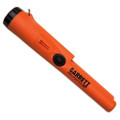Mississippi is neither particularly large nor densely populated. Despite this, the state is steeped in history. Located in the Deep South, it has been the site of some of the most important events in American history.
Most notably, Mississippi holds the distinction of being the second state to secede from the Union as the American Civil War neared. From there, it became a founding state of the Confederacy. Civil War artifacts can still be found in the state's soil.
Prior to the Civil War, Mississippi was inhabited by French and British settlers. Evidence of their time in the state is frequently unearthed by metal detector hobbyists. It's also possible to find artifacts left behind by Mississippi's indigenous tribes. These native residents are thought to have lived in the area as far back as 10,000 BC.
There are countless historic sites in Mississippi. This can make it a challenge for metal detector hobbyists to decide where they should focus their hunt. That's why we've put together this comprehensive article. Below, we'll be examining the state's most productive spots. We'll also give you an overview of Mississippi's metal detecting laws and metal detecting clubs.
Laws
Metal detecting in Mississippi is regulated by the Archeological Resources Protection Act. The ARPA is a federal law regulating metal detecting all across America. Its aim is to preserve items of historical and cultural significance. This law prohibits the removal of man-made objects more than 100 years of age from public ground.
The ARPA does not apply to metal detecting done on private property. Anyone planning to use their metal detector on private property should obtain the written permission of the landowner beforehand.
Local Rules and Regulations
Mississippi's metal detecting laws are fairly lenient. The activity is allowed in most spots throughout the state. The only sites that are absolutely off limits are landmarks. This means no metal detecting at monuments, historic buildings, or shipwrecks. For further clarification on what is and isn't a landmark, you can contact the Mississippi Department of Archives and History.
Metal detecting is allowed at most of Mississippi's national and state parks. Some parks may require you to have a permit. Others will allow you to use your metal detector without one. We suggest contacting the park you plan on visiting to determine if a permit is needed.
In most cases, a permit is required for digging. Even if a location doesn't require you to have a permit to use your metal detector, you will have to obtain one to break ground. Even with a digging permit, you will be asked to use handheld tools only.
If your digging leads you to an item that appears to be more than 100 years old, you may not disturb it. Mississippi law requires you to leave it be and alert authorities to its presence. For a shortcut around laws such as this, you should consider metal detecting on private property.
Best Metal Detecting Equipment
| Product | ||
|---|---|---|
| Metal Detector |  |
|
| Edge Digger |  |
|
| Pin-Pointer |  |
|
| Knee Pads |  |
Best Spots
The four spots listed below will give you the best chances for success.
Mississippi River
One of Mississippi's most famous attractions is the Mississippi River. This river has been the site of numerous shipwrecks over the years. Some of these ships are said to have belonged to pirates carrying large quantities of gold. If these stories are true, then there must be millions in unclaimed treasure lying beneath the river.
You can also expect to find buttons, coins, and jewelry along the Mississippi River. In most cases, these items will have been left behind by fishermen or other treasure hunters. However on occasion you may find a relic dating back hundreds of years. For the highest chances of success, bring along an underwater metal detector. This will allow you to search the deepest depths of the river without threat to your equipment.
The Mississippi River can be accessed through various towns and cities. Noteworthy locations that the river runs through include Greenville and Vicksburg.
Rodney

Mississippi is home to a number of ghost towns that are just as productive as they are eerie. Take the Jackson County ghost town of Rodney, for example.
Rodney was settled in 1828. Although it began as little more than a village, it soon expanded to include a church, a school, a post office, as well as countless stores and saloons. It eventually achieved city status.
The Civil War was harsh on Rodney. Mother Nature was even harsher. During the 19th and 20th centuries, the town suffered a number of natural disasters. By 2000, most of its residents had fled.
Although Rodney is considered a ghost town, there are a few residents who still call it home. If you show them respect, then it's possible that they will permit you to use your metal detector on their private property. This could lead you to some great finds.
Americus
Americus is another Mississippi ghost town. It's most noteworthy for being the seat of the Jackson County government for most of the 19th century. It was also home to the county courthouse.
The presence of government officials bolstered the economy of Americus and guaranteed its previously poor residents a steady income. Sadly, the courthouse and government relocated in 1870. This had disastrous effects on Americus and before long the town was nothing but weeds and abandoned buildings.
Metal detecting in Americus can prove extremely fruitful. Many treasure hunters have uncovered tools left behind by the farmers who inhabited the state in the 1800s. Others have found items that belonged to former government officials.
Clarkco State Park
Clarkco State Park is located in Clark County, Mississippi. The park stretches across 815 acres. This means that there is plenty of room for metal detecting in the park.
We recommend Clarkco State Park to any treasure hunter interested in Native American history. Artifacts from indigenous people have been discovered on the grounds in the past. In most cases, these artifacts have been arrowheads, although additional tools and weapons have also been found.
It's not uncommon to find jewelry and money left behind by recent park visitors. If you find any of these items then you should be sure to turn them over to the park's Lost and Found.
Remember to contact park officials before visiting Clarkco State Park. They'll let you know if you need a permit to metal detect in the park.
Metal Detecting Clubs
If you're new to metal detecting in Mississippi then we suggest consulting one of the state's metal detecting clubs. Your fellow metal detecting enthusiasts will be able to help you find additional productive sites in the state. They may also accompany you on your search. After all, the only thing that makes treasure hunting more fun is doing it with a friend! Some of the top metal detecting clubs in Mississippi include:
- Southern Historical Research and Recovery Association
- South Mississippi Metal Detecting Club
- Tri-State Coin and Relic Hunters Club
Conclusion
Mississippi is a small state, but its treasure hunting potential is enormous. Across the region, you can uncover relics from indigenous tribes, European settlers, and Civil War soldiers. Such a variety of artifacts cannot be found in many larger states.
Neighboring states also offer good opportunities. We recommend metal detecting in Alabama, metal detecting in Arkansas, and metal detecting in Louisiana.
